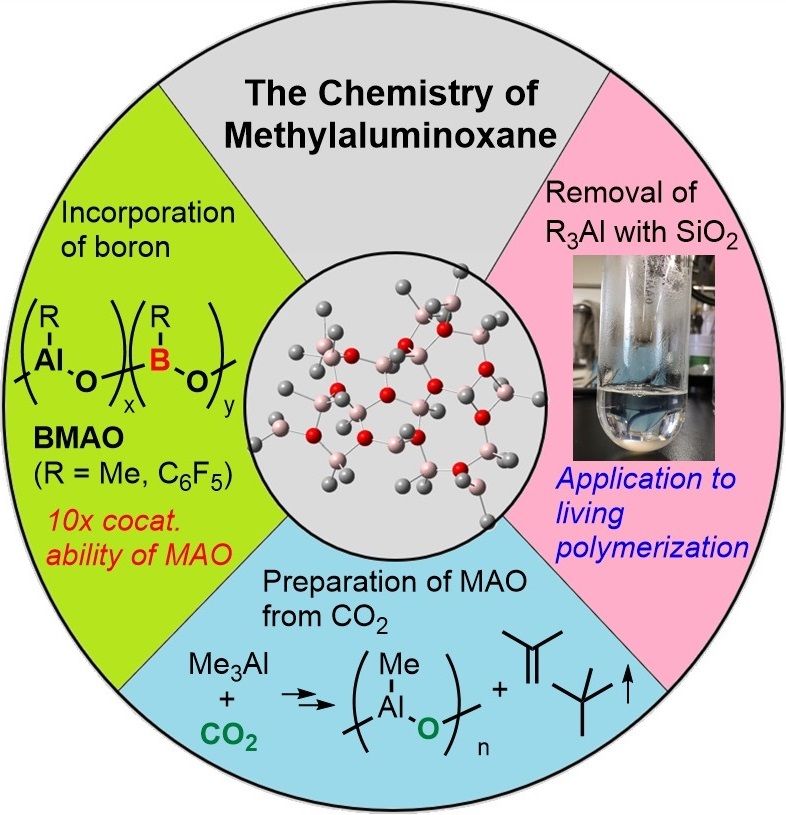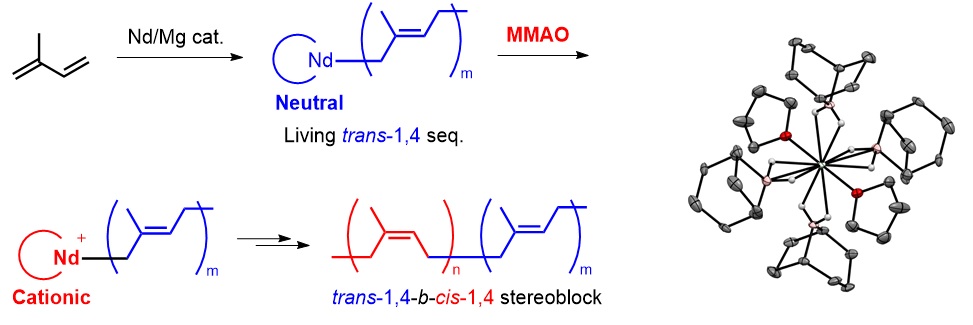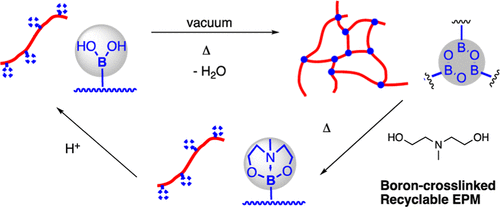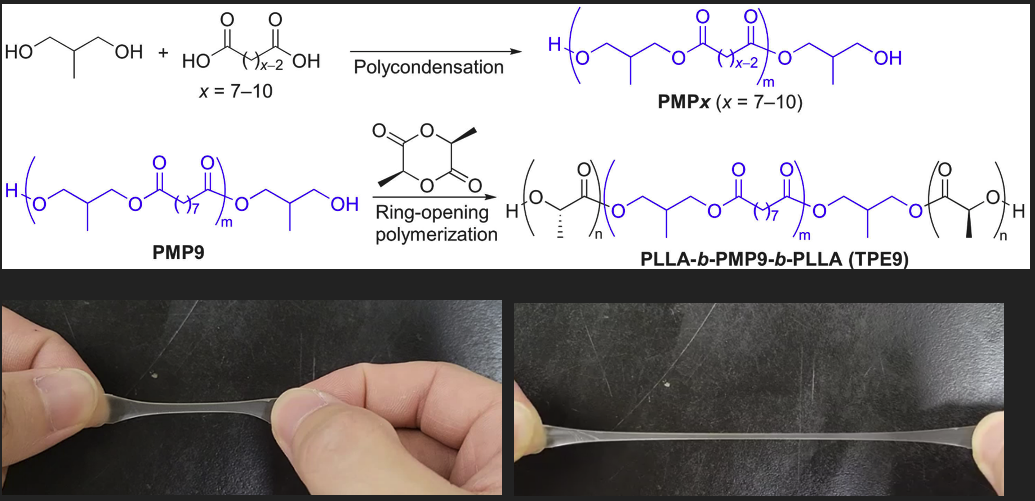Research Interests
We are providing new strategies for polymer synthesis based on organometallic chemistry. Especially, we are focusing on the development of scaffolds that can be precursors of counteranion in coordination polymerization catalyst system. A group member can learn various techniques and methods such as standard Schlenk techniques, NMR spectroscopy, X-ray crystallography, and computational chemistry. The projects shown below are currently ongoing.1. Fluorinated organoborane catalyst
Fluoroarylboranes are one of the most important classes of Lewis acids, which is used for a variety of catalytic reactions including coordination polymerization, cationic polymerization, and ring-opening polymerization. Fluoroarylborane involves in various catalytic mechanisms and is often combined with transition-metal catalysts or bulky Lewis bases. Recently, we developed a new fluoroarylborane compound, fluoroboradihydroanthracene, which shows conventional Lewis acidity as well as strong Bronsted acidity, although the compound is neutral and highly soluble in low dielectric constant solvents. This compound thus possesses high activation property of coordination polymerization catalysts and enabled the synthesis of ultrahigh molecular weight polypropylene (Mn > 10^6). This compound is also applied to the selective cationic polymerization of cyclic olefins from plants.
2. Chemistry of Methylaluminoxane
Methylaluminoxane (MAO) is a very important Lewis acid for coordination polymerization because it shows versatile activation properties toward transition metal-based catalysts in coordination polymerization chemistry. Along with recent emerging understandings of the structure and the origin of activation properties, we are developing some new preparation or modification methods of MAO which improves cocatalyst performance and/or easiness to handle, such as 1) incorporation of heteroatoms into the main chain of MAO, 2) practical removal method of trialkylaluminums from MAO, and 3) simple oxidation of MAO.

3. Development of ring-opening polymerization catalysts with low environmental impact
Aliphatic polyesters such as poly(lactic acid) (PLA) and poly(ε-caprolactone) (PCL) are synthesized by the ring-opening polymerization (ROP) of cyclic ester monomers. Tin(II) 2-ethylhexanoate is widely used for such polymerizations. However, the potentially harmful effects of tin catalyst residues on biological systems should be a problem, especially in biomedical applications. We have been developing new polymerization catalyst systems using less harmful elements. For example, the catalyst systems with a combination of a bulky Lewis acidic aluminum compound and a bulky Lewis base were found to exhibit high activity in the ROP of lactide, the cyclic dimer of lactic acid, producing PLA with narrow molecular weight distribution. In contrast, the systems of Lewis acidic boron compounds with bulky phosphines result in the selective formation of 1:1 adducts of lactide and alcohols. Furthermore, Lewis acidic iron compounds have been discovered to promote the ROP of lactide and ε-caprolactone, and their copolymerization behaviors were found to be controllable by bulky Lewis bases. Additionally, we have reported for the first time a ROP catalyst system utilizing silicon at the active site.

4. Lanthanide complex catalysts for diene polymerizations
Precise control of the primary structure of polyisoprene and polybutadiene is important because their thermal, physical, and mechanical properties are greatly influenced by their stereoregularity. With a series of new organoborohydrido neodymium complexes, we have opened up the way to synthesize new poly(conjugated diene)s which bears tailored microstructure, molecular weight, and its distribution. For example, by controlling the valence of neodymium borohydride catalyst during polymerization with methylaluminoxane, we succeeded in synthesizing steredioblock polyisoprene and polybutadiene which is consist of cis-1,4 and trans-1,4 specific blocks.

5. Development of recyclable hydrocarbon polymers using dynamic covalent bonds
Boronic acid functionalities in the synthetic polymer have recently been paid great attention because they are applicable to reversible star assembly and crosslinking using their reversible transformation abilities. We recently have achieved the incorporation of boronic acids into the chain end or main chain by the direct copolymerization of vinyl monomers bearing boronic acid moieties. Especially, random copolymerization of boronic acid-containing comonomers has been challenging because boronic acid is not tolerant to the coordination polymerization conditions, and our comonomer design enabled to copolymerize boronic amide comonomer and propylene in highly isospecific manner. These copolymerization strategies were currently applied for reprocessable hydrocarbon rubber materials like ethylene-propylene rubber.

An inteview regarding this topic is on the University webpage.
6. Synthesis of New Biodegradable Polymers in Various Environments
In recent years, the polymers derived from renewable resources and polymers with biodegradability and recyclability have been attracting research efforts to reduce the environmental impact of polymer waste. PLA has been attracting attention due to its biodegradability and sustainability. However, PLA is a relatively hard but somewhat brittle polymer. We have been developing thermoplastic elastomers with high degradability in the ocean by precisely constructing triblock copolymers with a soft aliphatic polyester block at the center and hard PLA blocks at both ends, from easily available raw materials. They were found to be highly biodegradable in seawater.

7. Synthesis of novel sequential copolyesters having relatively high melting temperature and biodegradability
Aromatic polyesters such as poly(ethylene terephthalate) (PET) have excellent thermal and mechanical properties and are widely used, but these polymers are non-biodegradable in the general environment. Aliphatic-aromatic copolyesters such as poly(butylene adipate-co-terephthalate) are biodegradable, but random copolymerization of multiple monomers generally results in reduced crystallinity and lower melting points. We synthesized novel copolymers with relatively high melting points and biodegradability by the controlled introduction of glycolic acid or γ-aminobutyric acid units, which are the building blocks of biodegradable poly(glycolic acid) and polyamide 4, into PET. The new sequence-controlled copolymers were found to show high melting points and biodegradability.


